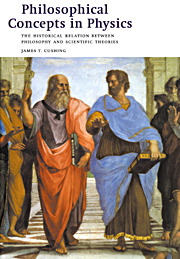 Philosophical Concepts in Physics
Philosophical Concepts in Physics Published online by Cambridge University Press: 05 June 2012
This book has grown out of an elective, one-semester junior/senior level interdisciplinary course I have taught for several years to students in arts and letters, science, and engineering at the University of Notre Dame. It allows one to examine a selection of philosophical issues in the context of specific episodes of the development of physical laws and theories. Many students with science and engineering backgrounds find this exercise informative – for some unsettling, but still rewarding. Although a major goal of the exposition is to impress upon the reader the essential and ineliminable role that philosophical considerations have played in the actual practice of science, more space is devoted to the history and content of science than to philosophy per se. The reason for this is that I believe that meaningful and useful philosophy of science can only be done within the context of the often tortuous historical route to new insights. Another way to put this is that it takes a lot of history of science to anchor even a little philosophy of science.
Some necessary background from the history of ancient and early modern science is presented first, but major emphasis is given to the immediate precursors to and the content of the watersheds of twentieth-century physics: relativity and, especially, quantum mechanics. This is not a systematic exposition of either the history or the philosophy of science, but an individualistic, perhaps to some even an idiosyncratic, selection of topics and episodes from the history and philosophy of physics.
To save this book to your Kindle, first ensure [email protected] is added to your Approved Personal Document E-mail List under your Personal Document Settings on the Manage Your Content and Devices page of your Amazon account. Then enter the ‘name’ part of your Kindle email address below. Find out more about saving to your Kindle.
Note you can select to save to either the @free.kindle.com or @kindle.com variations. ‘@free.kindle.com’ emails are free but can only be saved to your device when it is connected to wi-fi. ‘@kindle.com’ emails can be delivered even when you are not connected to wi-fi, but note that service fees apply.
Find out more about the Kindle Personal Document Service.
To save content items to your account, please confirm that you agree to abide by our usage policies. If this is the first time you use this feature, you will be asked to authorise Cambridge Core to connect with your account. Find out more about saving content to Dropbox.
To save content items to your account, please confirm that you agree to abide by our usage policies. If this is the first time you use this feature, you will be asked to authorise Cambridge Core to connect with your account. Find out more about saving content to Google Drive.